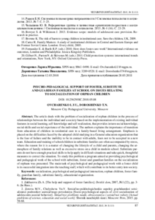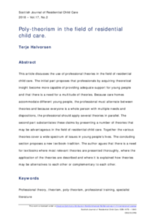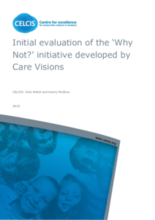Displaying 751 - 760 of 1510
The National Commission for the Protection of Child Rights (NCPCR) of India has formulated this Standard Operating Procedure (SOP) in order to address gaps in current policy regarding the death of a child in a Child Care Institution (CCI) and the duty of Child Care Institutions to address issues such as escape, runaway or sexual abuse of children in the CCI.
The article deals with the problem of socialization of orphan children in the process of relationships between the individual and a society based on the implementation of existing individual features in social learning, self-knowledge and self-realization, that provides in turn social knowledge, social skills and social experience of the individual.
The paper articulates accomplishments of child and youth care centres in providing care and support to children identified to be at risk of significant harm in Soweto, South Africa.
This article discusses the use of professional theories in the field of residential child care.
The objective of this article is to present a portrait of the baby factory phenomenon in Nigeria. The precipitating factors that fuel the trade are discussed, and suggestions for an enduring approach to combat this crime are offered.
‘Prepare for Leaving Care – A Child Protection System that Works for Professionals and Young People’, a two-year project co-funded by the Rights, Equality and Citizenship (REC) Programme of the European Union (2017-2018), aims to ensure that the rights of young people in alternative care are respected and that they are prepared for an independent life.
This study examines adult outcomes of youths (N=251) who spent time in a Dutch judicial treatment institution.
This article describes what could be learned from a project focused on monitoring the living group climate in a residential youth care service in Flanders, Belgium.
This short document provides a summary of initial learning from data gathered for an evaluation of the Why Not? initiative in Scotland. The Why Not? initiative within Care Visions services was started in 2014 to ‘improve the way young people are supported when ageing out of care, by offering a different experience of relationships beyond care.’
The purpose of the present Situation Analysis of Children with Disabilities in Albania is to generate comprehensive knowledge about children with disabilities to inform concrete actions by the Albanian government and UNICEF Albania to address the most critical rights violations of children with disabilities.





